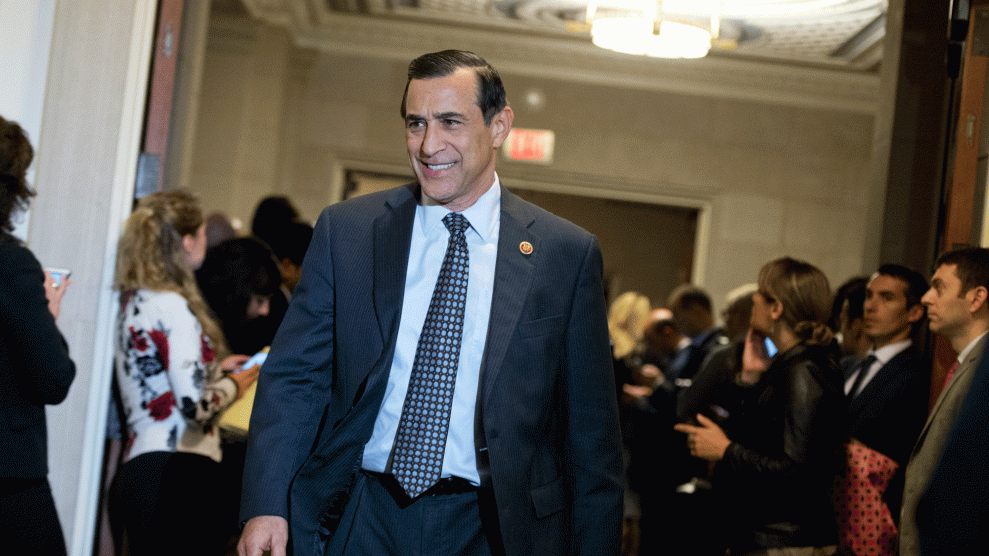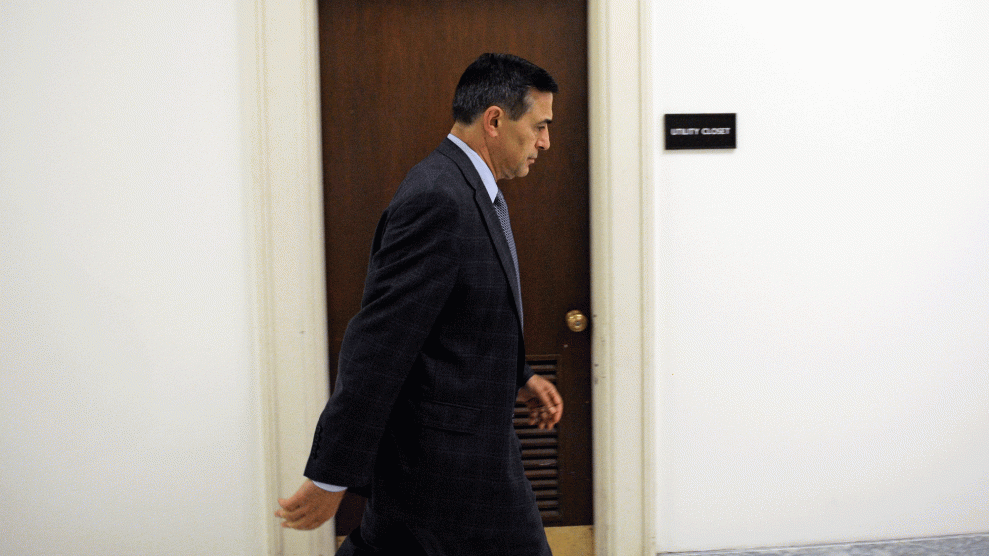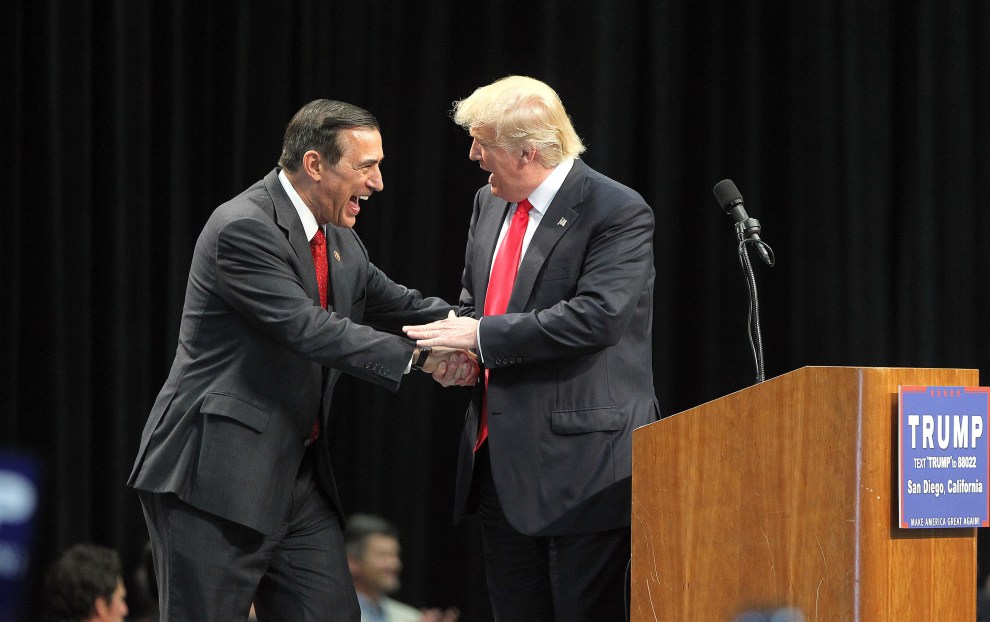
Darrell Issa on his way to a meeting in October 2015Tom Williams/CQ Roll Call/AP
Rep. Darrell Issa (R-Calif.), an early and outspoken supporter of Donald Trump during the presidential campaign, is known for launching frequent investigations of Democrats. Then, in a February 24 appearance on Real Time With Bill Maher, he suddenly became the first congressional Republican to call for a special prosecutor to investigate Trump’s election. He’s long used conspiracy theories to battle established climate science, yet on Thursday he joined the Climate Solutions Caucus, a bipartisan group of legislators dedicated to fighting climate change.
Why the about-face? The former chair of the House Oversight Committee—famous for his high-theater, low-yield investigations into alleged Democratic scandals involving Benghazi, the IRS, the gun sting gone awry known as Operation Fast and Furious, and Healthcare.gov, among others—is suddenly facing a very tough election. California’s 49th Congressional District, where Issa has reigned for more than 16 years, has a growing Latino population that has helped push it slowly but steadily leftward. In November, Issa eked out a win over Democrat Doug Applegate, a political newcomer, by just 1,680 votes. Orange County, part of which falls within Issa’s district, favored Hillary Clinton by a nine-point margin, marking the first time it voted for a Democrat for president since 1936. The New York Times recently called Issa “probably the nation’s most vulnerable incumbent.”
Every week since the election, hundreds of people have descended on his San Diego County office to protest. Critics organized a town hall five miles from his office and raised $6,000 through a GoFundMe campaign for a full-page newspaper ad urging him to appear. Citing a “long-standing obligation” to tour a homeless shelter, he didn’t show. Instead, he was represented by a giant “Where’s Waldo?” cutout with his picture taped to its face.
“It’s been clear to those of us who live here that he’s been in campaign mode 24/7,” says Francine Busby, chair of the San Diego County Democratic Party. “He’s definitely feeling the heat down here. I have no doubt that the Republican warrior who has always toed the party line to the nth degree, who is now changing his tune, has very personal motivations because of the vulnerability he feels in his seat.”
Upon learning that Issa had joined the Climate Solutions Caucus, one San Diego Republican political operative who asked to remain anonymous told Mother Jones, “Wow. That is definitely a calculated move.” Issa voted against the 2009 climate and clean-energy jobs bill and continues to make false claims that “there is a wide range of scientific opinion” on climate change and that “the science community does not agree to the extent of the problem.” The League of Conservation Voters gives him a lifetime score of just 4 percent for overwhelmingly voting “anti-environment” during his years in Congress. In 2013, the organization gave him a “Climate Change Denier” award for “his extreme anti-science views, which put him at odds with 97 percent of scientists and a majority of the American people.”
Issa represents a “highly environmentally conscious district,” the operative says, where Republicans “can’t really win being anti-environment. Even the more conservative Republicans still are pretty centrist on climate issues and the environment. It doesn’t surprise me that he would see that as beneficial, and I have a feeling that polling issues are guiding that too.”
Some observers think Issa’s call for a special prosecutor to investigate Russia’s role in the election might not have been a calculated attempt to distance himself from Trump and pacify his constituents. He may simply have said more than he intended in his appearance on Maher’s show. “I don’t think he was prepared to have that question addressed to him,” says Busby. “There were two busloads of people who had been protesting him every step of the way in that studio that night, and I think that may have influenced his remarks.”
“My read on it,” says the Republican political operative, “was that this was probably a moment of intellectual honesty, particularly given his role on oversight, as something he would have suggested the Obama administration wouldn’t be trusted to investigate themselves.” But he added, “These kinds of things are probably top-of-mind as opportunities to pander, and this will show that ‘I am independent and not a Trumpster.'”
If Issa blurted out more than he meant to, he was bailed out a few days later by news that Attorney General Jeff Sessions had failed to disclose meetings with a Russian diplomat during the 2016 election. “News overnight affirms what I’ve been saying: we need an independent review and Jeff Sessions should recuse himself,” Issa tweeted on Thursday.
Kurt Bardella, a former Issa staffer who criticized Issa’s embrace of Trump during the campaign, doesn’t see Issa’s call for a special prosecutor as a political maneuver. “There were countless times that Darrell led the charge for impartial and independent investigations during the Obama Administration because he recognized the inherent conflict in the idea of self-policing,” Bardella says. “Anyone trying to speculate that what he said was because of pressure from his district is clearly unfamiliar with his extensive oversight body of work.” And climate change, Bardella adds, “has never been an issue that carries any weight in terms of the district.”
Whatever his reasons, it seems clear that as Issa’s constituents continue their leftward march, the congressman is starting to follow them.

















